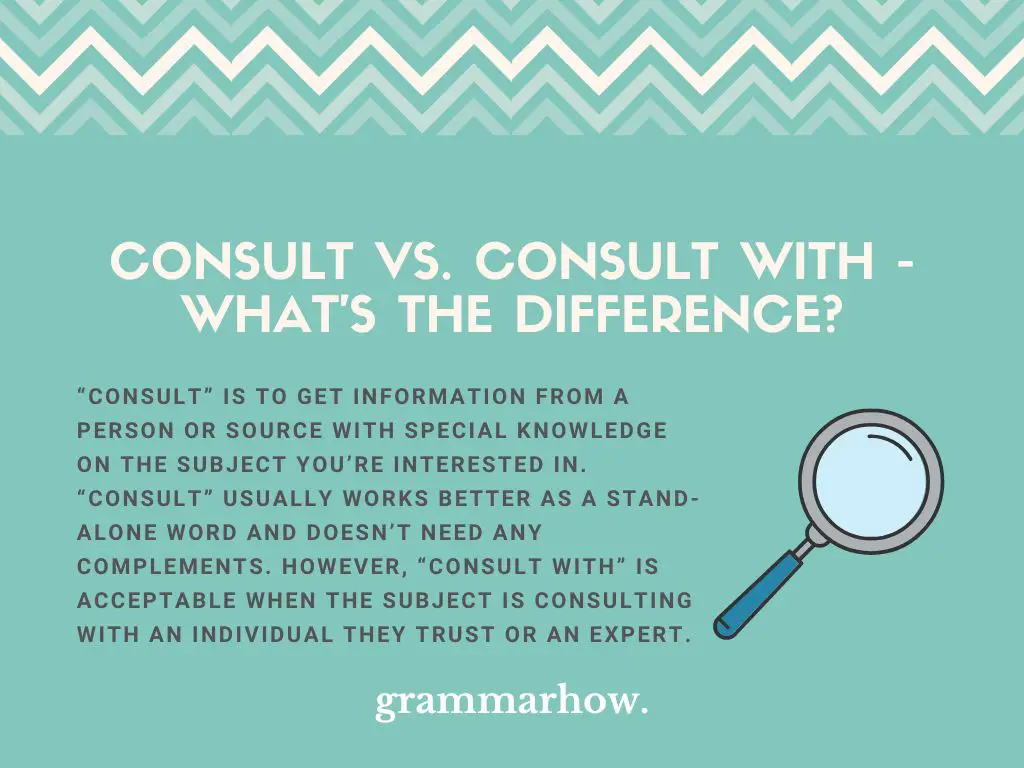Sometimes we all need help obtaining information. We can do it by using many sources: talking to people, online, researching books, etc. When looking for information, do you say “Consult” or “Consult With”?
We want to know which form is correct and when it’s appropriate to use it.
Consult vs. Consult With – What’s the Difference?
“Consult” is to get information from a person or source with special knowledge on the subject you’re interested in. “Consult” usually works better as a stand-alone word and doesn’t need any complements. However, “Consult With” is acceptable when the subject is consulting with an individual they trust or an expert.

Take a look at some examples:
- You should consult your lawyer before making any decisions.
- You should consult with your lawyer before making any decisions.
- When I don’t know the meaning of a word, I consult a dictionary.
- When I don’t know the meaning of a word, I consult with a dictionary. (incorrect)
The examples show two sets of sentences. Each set contains the same sentence, one using “Consult” and the other using “Consult With”.
In the first set, both sentences work: you can say you’ll “Consult” a lawyer or “Consult With” a lawyer, and the message the sentence conveys is the same. In that situation, those forms can interchange.
Keep in mind, though, that even being grammatically correct, it isn’t necessary to say “Consult With”. The point is that “With” is extra, and it isn’t required to make it clear who you’ll talk to before making a decision.
In the second set, the subject says they like to “Consult” dictionaries. In this case, it’s incorrect to say “Consult With”, because the dictionary isn’t a person.
Consult
“Consult” is to get information from a person or material, who is an expert or has expert knowledge about a topic you’re interested in. “Consult” is a formal word, that makes a sentence sound more polished.
Let’s go over some nice examples:
- Anthony consulted his doctor about his disease.
- You should consult the manager about the hours.
- James quickly consulted a dictionary for the definition of the word.
- Make sure to consult the textbook for questions 3 to 7.
- I consulted the programming director for help on the assignment.
- Diana always consults reliable sources before making important decisions.
Consult With
“Consult With” is an alternate form for “Consult”. It can only be used when describing that a trusted person or an expert was consulted about a topic. You shouldn’t use “Consult With” to indicate that an item such as a book was consulted, for example.
Here are some examples:
- You should consult with loved ones when you need help.
- Nina consulted with her sister for advice on her relationship.
- For advice on the situation, Matthew consulted his best friend.
- My mother made sure to consult with Peter before she worried too much.
- Can we consult with the textbook during the final exam? (incorrect)
- Can we consult the textbook during the final exam?
Keep in mind that “Consult With” can only be used concerning the search for someone’s advice. Also, in every sentence where we used “Consult With”, the same message with no harm would have been conveyed by using only “Consult”.
In other words, “Consult With” is unnecessary. You can stick exclusively to “Consult” and your communications would continue to be impeccable.
Consult a Doctor or Consult With a Doctor?
Both forms, “Consult a Doctor” and “Consult With a Doctor”, are correct and acceptable. You can use “Consult With” because the doctor is a person. But you can also use just “Consult” because it’s not required that you use “With”.
Here are some examples:
- Consult your doctor if you have any side effects.
- Consult with your doctor if you have any side effects.
- If you’re concerned, you should consult your doctor.
- If you’re concerned, you should consult with your doctor.
Final Thoughts
“Consult” is the act of looking for advice, by asking questions to a person about a subject or researching a good source that would inform you (such as a book, for example). You can use “Consult With” when indicating that you spoke to someone you trust or an expert.

Martin holds a Master’s degree in Finance and International Business. He has six years of experience in professional communication with clients, executives, and colleagues. Furthermore, he has teaching experience from Aarhus University. Martin has been featured as an expert in communication and teaching on Forbes and Shopify. Read more about Martin here.
